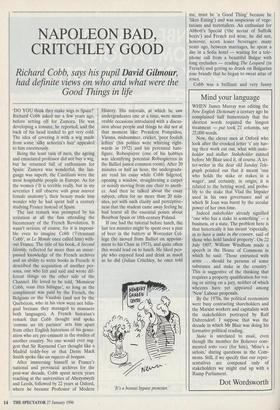Mind your language
WHEN James Murray was editing the New English Dictionary a century ago he complained half humorously that the shortest words required the longest treatment — put took 21 columns, say 25,000 words.
Now, the clever men at Oxford who look after the crooked letter 's' are hav- ing their work cut out, what with stake- holder and stalker. Stakeholder existed before Mr Blair used it, of course. A let- ter-writer in the dear old Sunday Tele- graph pointed out that it meant 'one who holds the stake or stakes in a wager', and certainly, in origin, it is related to the betting word, and proba- bly to the stake that Vlad the Impaler used in his own governance and at which St Joan was burnt by the secular power of her own time.
Indeed stakeholder already signified `one who has a stake in something' — a business, or a state. The problem here is that historically it has meant 'especially, in to have a stake in the country, said of those who hold landed property'. On 22 July 1807, William Windham made a speech in the House of Commons in which he said: 'Those entrusted with arms . . . should be persons of some substance and stake in the country.' This is suggestive of the thinking that requires a property qualification for vot- ing or sitting on a jury, neither of which wheezes have yet appeared among `New' Labour proposals.
By the 1970s, the political economists were busy contrasting shareholders and the Marxist workers and capitalists with the stakeholders portrayed by Ralf Dahrendorf. I suppose that was the decade in which Mr Blair was doing his formative political reading.
Stake is unrelated to steak, even though the member for Bolsover com- mented sotto voce (for him), 'Mine's a sirloin,' during questions in the Com- mons. Still, if we specify that our repre- sentatives are composed only of stakeholders we might end up with a Rump Parliament.
Dot Wordsworth


























































 Previous page
Previous page